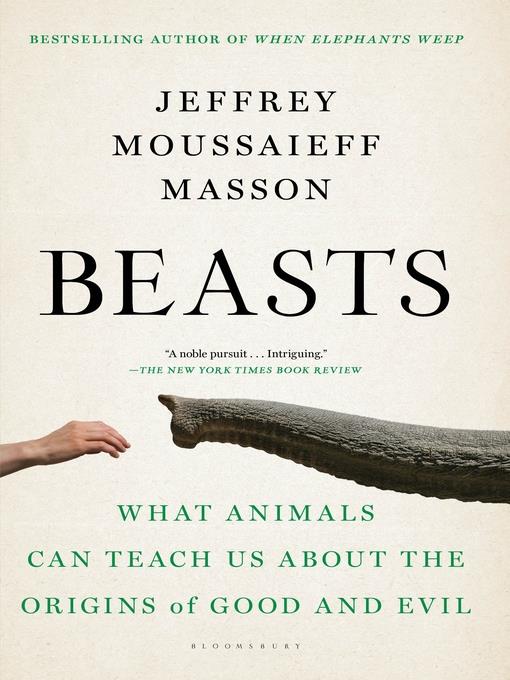
Beasts
What Animals Can Teach Us About the Origins of Good and Evil
کتاب های مرتبط
- اطلاعات
- نقد و بررسی
- دیدگاه کاربران
نقد و بررسی

December 23, 2013
Animal emotions expert and ex-psychoanalyst Masson (When Elephants Weep) looks to redeem animals, especially apex predators, from the reputation of being "cruel." He claims that the evidence mostly suggests that in the wild, interspecies and intraspecies violence is purposefulâwhether as a means to eat or maintain territoryâor that its origins lay in human-instigated trauma or interference in habitats, and that in fact humans "persist in self-destructive violent behavior typical of the animal kingdom." He goes to the early origins of civilization to explain our obsession with "othering"âtreating other persons or groups as intrinsically different from and alien to one's selfâblaming for this the development of social hierarchy, the idea of property that evolved through the rise of agriculture, and the idea of living things as property that arose from domestication of livestock. Masson's writing proves fascinating to read, but this round of animal ethology feels bogged down by his explicit agenda to convince the reader that human intellectual capacity allows us to make the morally correct choice to embrace kindness and altruism, to embrace vegetarianism, to stop animal exploitation, and to stop claiming human superiority over the rest of the animal world. Agent: Andy Ross, Andy Ross Literary Agency.

April 15, 2014
Masson (The Dog Who Couldn't Stop Loving: How Dogs Have Captured Our Hearts for Thousands of Years, 2010, etc.) explores evolutionary history and the animal kingdom for the origins of human violence. The title of the author's latest philosophical treatise gets to the heart of the paradox of human cruelty. When compassionate, humans are said to be humane; when violent, they are often compared to ferocious beasts. Even the famous ancient Roman saying, "Man is a wolf to [his fellow] man," attempts to characterize the human tendency to turn on a fellow creature via the metaphor of the predatory wolf. By looking at behavioral examples here and from elsewhere in the animal kingdom, Masson demonstrates a problem with this beastly association: Evidence suggests that wolves rarely turn on one another. Likewise, orcas, whose brains are much larger and whose life spans parallel ours, do not attack their own kind, and 170 years of field research has revealed only 10 to 20 chimpanzee-on-chimpanzee killings during that time. By contrast, Masson offers the example of the Battle of the Somme, where, by battle's end, "both sides sustained 1.3 million casualties." Masson persuasively presents his pacifist, staunchly pro-vegan agenda: Only humans "create artificial and arbitrary distinctions--different race; different language; different religion--for which we are willing to kill and die." Though the author is quick to admit that no other animal is as likely to come to the aid of another species as humans, he also shows that no other species is as eager to kill for sport. He supports Jared Diamond's theory that this unrelenting aggression may be traced back over 10,000 years to the advent of agriculture, which introduced multiple levels of social inequality and led to the domestication of animals; this, Masson argues, "has perpetuated a culture of cruelty and abuse. We watch animals who are our prisoners with no awareness of the suffering we have caused them." A compelling, unsettling, provocative examination of the relation of beast to man.
COPYRIGHT(2014) Kirkus Reviews, ALL RIGHTS RESERVED.

February 1, 2014
Masson (When Elephants Weep) explores here what animals can teach us about good and evil. He argues that humans have often categorized animals as "beasts" to imply that they are immoral and uncivilized. However, he continues, animals have a kind of morality and are in fact generally much less violent than humans. In some cases where animals are violent--such as cases of chimpanzee-on-chimpanzee attack--Masson argues the aggression may be owing to human interference. He views agriculture and domestication of animals as unfortunate developments in human history leading to an unhealthy relationship between humans and animals, one that he believes has led to a psychological traumatization that perpetuates human violence. Masson's animal rights philosophy and veganism clearly influence how he frames his argument, and in some places the case seems too simplistic. He does admit that some facts don't fit with his views. Nonetheless, this is a thought-provoking look into animal behavior and violence, with some new observations on the subject, demonstrating that animal behavior is a field of study in which much more research awaits. VERDICT Recommended to readers interested in animal rights and human-animal behavior.--Scott Vieira, Sam Houston State Univ. Lib., Huntsville, TX
Copyright 2014 Library Journal, LLC Used with permission.

























دیدگاه کاربران